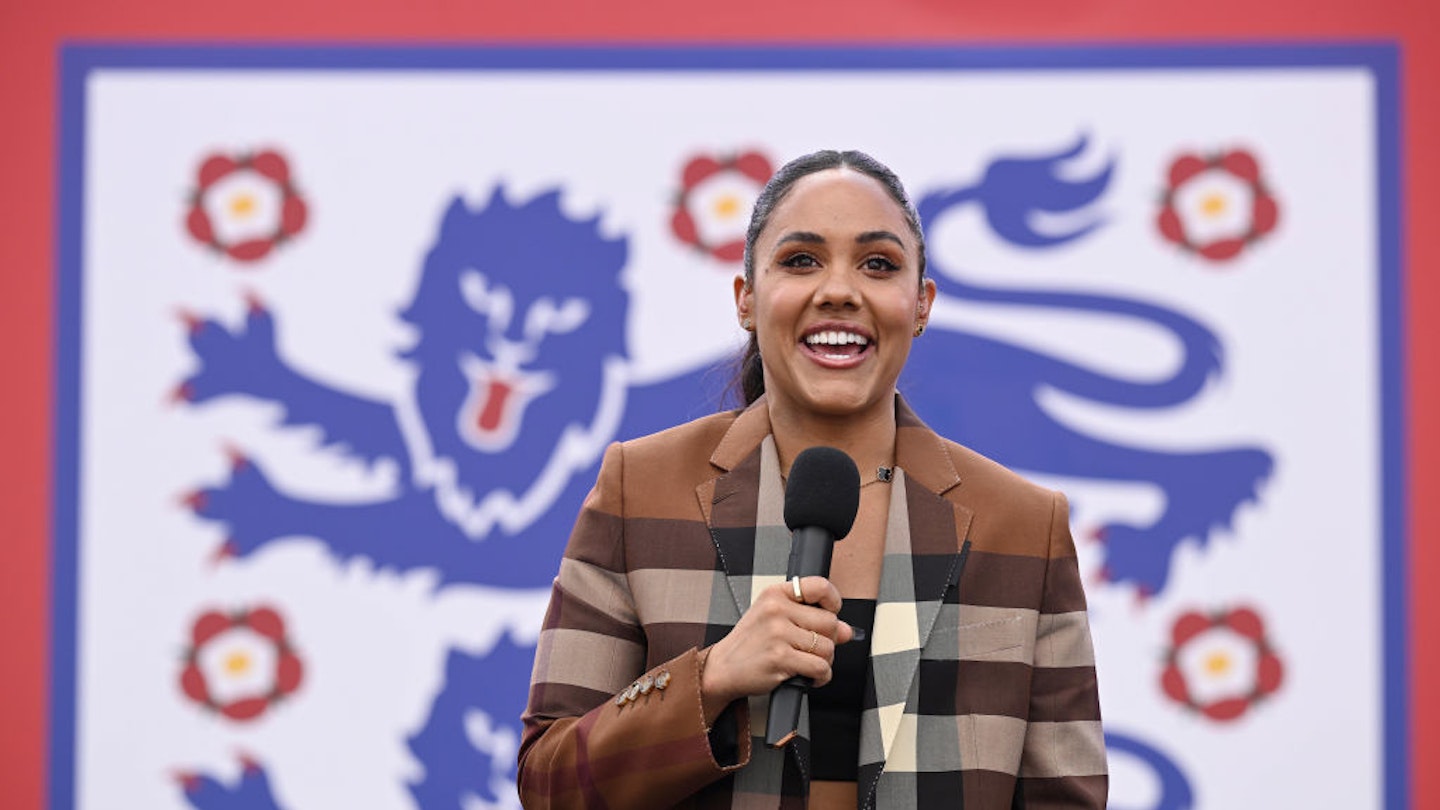We interviewed Alex before last night's final had taken place - the full interview will appear in this week's Grazia magazine.
As England's Lionesses became European champions last night, one woman watching knew how long a moment like that has been in the making.
‘Young Alex would never believe it,’ says a beaming Alex Scott, the 37-year-old Football Focus host and former England and Arsenal player, who for the past few weeks has been leading the BBC’s coverage of the Women’s Euro 2022, alongside Gabby Logan and Ian Wright.
Even those of us who don’t follow football, let alone women’s football, will have found it hard to ignore the excitement as England progressed through the competition. But regardless of whether they won, the last few weeks have shown how the women’s game can be every bit as exciting and lucrative as the men’s, when properly invested in. Attendance records for Women’s Euro games have been smashed, with more than 500,000 tickets sold before the first whistle even blew.
‘That’s the thing that makes me smile,’ says Alex. ‘Women’s football has always had a core following, but this summer the whole country has got to see how good these girls are. When I get in a taxi, or walk into a shop, people are having conversations about the game. Taxi drivers will say, “Alex, I watched the game last night, it was brilliant.” You can feel the buzz.’
Critics have argued for years that women’s football has been underfunded and sidelined. Earlier this year, however, The FA (Football Association) pledged to ‘significantly increase’ the prize fund for the Women’s FA Cup, which is currently less than 2% of the overall prize money of almost £2 million. Things are slowly changing, says Alex. ‘Every summer, we’ve taken baby steps towards a fairer playing field, improving things such as maternity leave, which the FA has only just brought in. Can you believe that? Before this, women had to choose between having
a baby and continuing their footballing career. We’ve had to fight and fight – for fairer pay, for fairer treatment.’
Born and raised on an east London council estate, Alex and her older brother played football ‘every waking moment’. Her mother juggled several part-time jobs, from hotel cleaner to bar manager, to support her children. Alex’s father left when she was seven. ‘I often wonder how she did it. We were never supposed to amount to much, but my mum had this incredible work ethic.’
At the age of eight, Alex was spotted playing football in ‘the cage’, a football cage on her local estate, by Vic Akers, then Arsenal Ladies manager. Spotting her potential, he suggested Alex go and meet the Arsenal Women’s team. Her reply? ‘“I didn’t even know there were women’s teams?” It’s not until he made me go down for that trial that my life changed.’
We've had to fight and fight - for fairer pay, for fairer treatment
Signed on the spot by Arsenal, she began training three times a week after school, taking a 40-minute bus ride from her home in Poplar to the Highbury training ground. She made the journey alone because her mother had to work. ‘I never saw it as a hardship, though,’ she says. ‘Children growing up where I did weren’t handed anything on a plate. I knew I had to work hard.’
As she progressed through the footballing ranks, Alex played in three World Cups, four European Championships, an Olympic Games, and won 140 England caps. During her Arsenal years, however, Alex and her teammates wore hand-me-down kits and boots from the men’s team and worked in the Arsenal laundry room to earn money. ‘We were all working part-time, or studying, while training for a World Cup,’ she says. ‘Thankfully, due to investment in the women’s games, they don’t need to do
that any more.’
She retired from the game in 2017 and began unpaid work placements at Sky Sports, which led to her presenting for Soccer AM, and in 2018 she became the first female football pundit to be taken to a World Cup by the BBC. ‘I still had that mindset from my childhood, and from football. I’m never one to sit in a comfort zone. Whether it’s doing Strictly [she took part in the 2019 series], interviewing Ryan Gosling on The One Show, or doing live TV, I’m so grateful for every opportunity that comes my way.’
And she wants these opportunities for other young girls coming through, too, and recently said, ‘The women’s game has grown and cages [concrete pitches on many council estates in London] aren’t as important any more. Instead, all these academies have appeared that are maybe two hours away, and an inner-city street kid doesn’t have the financial means to access them.’
When I ask her about this she says, ‘We had to grow women’s football, but everybody needs opportunity. They took city centres of excellence and moved them to leafy areas, like Hertfordshire, which made it harder for girls from cities, or single parent families.’ However, she’s confident the FA is now addressing this.
‘Every girl needs access to the pathway to the top. Football gave me, a girl from a council estate in the East End, a whole new world. It’s given me everything I have in my life.’ With Alex still in the game, you get the sense the future of women’s football is in safe hands.
‘Alex Scott: The Future Of Women’s Football’ is available on BBC iPlayer. Alex’s book, ‘How (Not) To Be Strong’, will be published by Century on 29 September.
